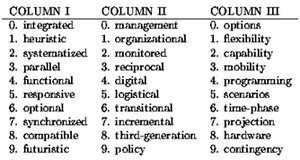 I remember reading a column in an airline in flight magazine on jargon. Even though it’s been several years, I still remember this column. The author began by saying that he has a folder of memos with obtuse language that he has collected over the years. He shared one memo that a friend sent to him. I was so struck by the language that I saved it on my hard drive. The guy who wrote the memo said he was going to “map the handoffs and all processes in a combined swim lanes uber-process.” I’m pretty hip to a lot of business jargon as I see it every day. However, I must admit that “swim lanes uber-process is a new one on me.
I remember reading a column in an airline in flight magazine on jargon. Even though it’s been several years, I still remember this column. The author began by saying that he has a folder of memos with obtuse language that he has collected over the years. He shared one memo that a friend sent to him. I was so struck by the language that I saved it on my hard drive. The guy who wrote the memo said he was going to “map the handoffs and all processes in a combined swim lanes uber-process.” I’m pretty hip to a lot of business jargon as I see it every day. However, I must admit that “swim lanes uber-process is a new one on me.
As I’m writing this, I’m reminded of an IBM commercial I saw recently. A guy walks into a large, dimly lighted conference room where e sees no tables and chairs and about twenty people lying on the floor. He says, “What are you guys doing?” Someone answers, “We’re ideating.” He says, “What’s that?” Someone responds, “Coming up with new ways of doing things.” He says, “Why don’t you just call it that?”
Interestingly enough, the word ideating sounds a lot like a made up word to me. I expected spell check to flag it. It didn’t. So I guess I am behind the times on some of my business jargon. Even so, I think saying that you’re “Coming up with new ways of doing things,” is much more clear than saying that you’re “Ideating.” But what do I know?
This brings me to the Bafflegab Thesaurus. I first saw the Bafflegab Thesaurus back in the 1970s. It’s made a comeback lately, only this time it’s called “Buzzwords for Business Writing.” Whatever you choose to call it, it’s very clever, and it points out just how much jargon has taken over business communication.
Here’s how it works. When you’re stuck in your writing, this quick guide helps you create phrases that will make you sound as if you know what you’re talking about. It’s simple. Think of any three-digit number, then select the corresponding buzzword from each column. Voila! You’re done.

Here’s an example. The three-digit number 257 produces “systematized logistical projection.” You can drop this phrase into almost any report. It has a ring of decisive, knowledgeable authority. Of course, no one will have the remotest idea of what you’re talking about. But that’s OK. The important thing is, they are not about to admit it.
Realize that I’m joking here. While “systematized logistical projection” may sound good, it really means nothing. The best writers use small words, simple sentences, and the active voice. Never use this buzzword generator in your business communication.
There is a common sense point here. In conversation, writing and presenting, use simple, straight forward language that is likely to be understood by the person or people with whom you are communicating. Put yourself in the place of the other people. Use words and language that they are likely to understand.

Speak Your Mind